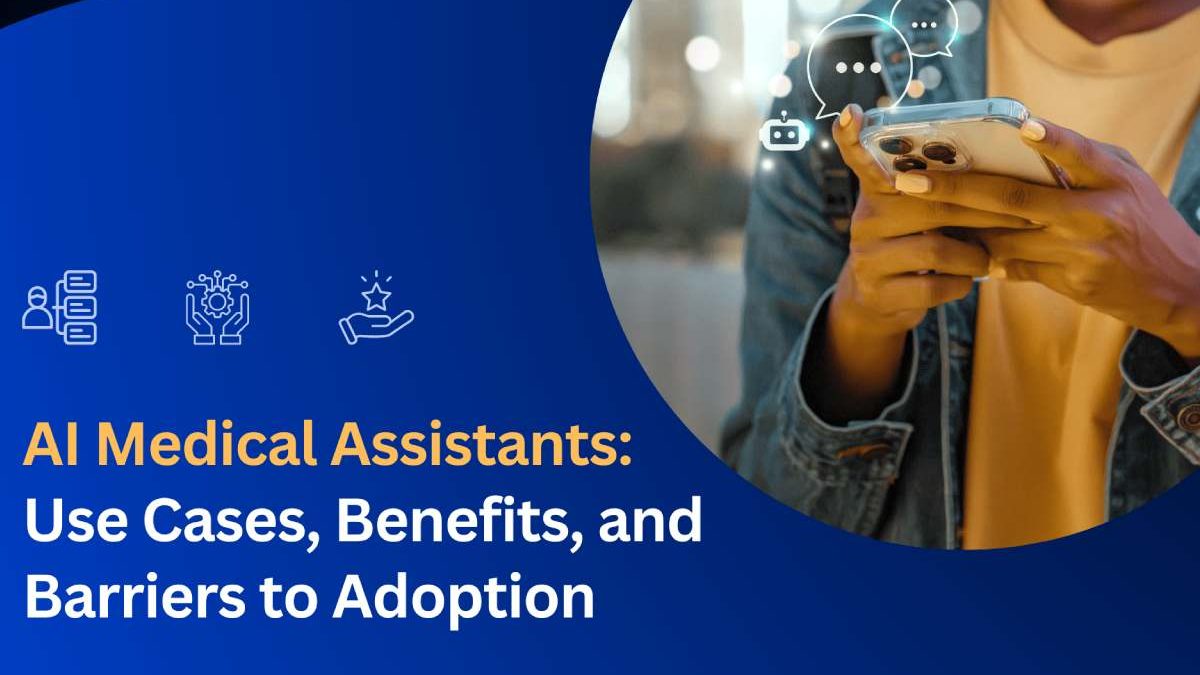Imagine a world where patients are able to get immediate answers regarding their symptoms, get help with medication management, and be directed to the appropriate type of care without ever having to interact with a human. Doesn’t that sound unrealistic?
Not anymore. That ideal is rapidly becoming a reality thanks to AI medical assistants. These intelligent digital assistants are not only transforming the way healthcare is delivered, but they are also making healthcare more patient-centered, accessible, and effective. Still not persuaded?
This article will discuss the expanding applications of AI medical assistants and their advantages for both patients and physicians. We’ll also discuss the challenges that currently stand in the way of the widespread adoption of AI medical assistants.
Table of Contents
ToggleArtificial Intelligence Medical Assistants: What Are They?
Artificial intelligence (AI) medical assistants are computer systems that employ natural language processing and machine learning. They perform a variety of duties to help patients and healthcare providers, such as classifying symptoms, making appointments, documenting consultations between patients and doctors, and answering frequently asked questions.
AI medical assistants are very versatile and can be integrated into various platforms such as hospital and clinic websites, chat interfaces, mobile apps, and telemedicine platforms. Let us consider some of the ways they are being put to use in actual healthcare environments.
Real-World Applications of AI Medical Assistants
Clinical Documentation
Paperwork and administrative tasks take up most of the working day for clinicians, reducing the amount of time spent with patients. AI solutions are solving this issue. AI Assistants can record and transcribe conversations between patients and clinicians in real-time, generating structured clinical notes (like a SOAP note), which then can be read and approved by a clinician.
Example:
The Permanente Medical Group in Northern California implemented ambient AI scribes for more than 10,000 physicians across 21 facilities with the goal of taking the paperwork burden off doctors. Early results indicated that the AI scribes freed physicians of the equivalent of 1,794 workdays in a year, nearly five years’ worth of work hours by limiting time spent on clinical notes.
Symptom Screening and Patient Triage
Chatbots with AI capabilities are increasingly being employed for patient-first assessments. By getting crucial information prior to a session, they help doctors save time and lessen administrative costs.
These assistants walk patients through a list of symptoms, offer advice on how to proceed, and even help them choose the best treatment. They also function as an on-demand information source, making available to patients instant access to trusted content on symptoms, medications, and treatment plans.
Example
SmartChat Assistant can be trained on a clinic’s own knowledge base to pose appropriate screening questions, perform automated patient intake, and refer patients to virtual or in-office care with the added benefit of delivering tailored health education.
Appointment and Reminder Scheduling
AI medical assistants also make scheduling tasks easy. Saving administrators a lot of time, they are able to schedule, cancel, and reschedule appointments, and send reminders to patients, which makes the process smooth and results in fewer no-shows.
Example:
The Cleveland Clinic used AI and machine learning to assist with scheduling and staffing. By integrating data from many sources, the system enables managers to make better and quicker staffing decisions. According to Cleveland Clinic, this improved operational efficiency and saved hours of manual labor by doing away with the frequent calls and meetings.
Medication Management
Let’s be real, AI medical assistants can be a crucial component in patient adherence to drug therapy, particularly for those with long-term chronic illnesses. The assistants can encourage patients to stay on track with their treatment regimen by sending reminders to take medicine. The assistants provide customized advice and respond to context-specific questions whether regarding side effects, dosage, or lifestyle factors.
By offering ongoing, easy-to-access assistance, AI technologies support better results and decrease the risk of complications from omitted or inappropriate use of drugs.
Example:
Randomized clinical trials prove that AI-based solutions are capable of enhancing medication adherence rates by 6.7% to 32.7% over control groups that employed traditional practice or no treatment. It is an extremely encouraging finding.
Mental Health Treatment
Healthcare workers are finding new ways that virtual medical assistants can assist with the mental health of their patients. AI assistants offer assistance through crisis intervention therapy, stress management instruction, and mood tracking.
Instead of substituting for human therapists, AI medical assistants offer additive support to patients, offering availability outside regular office hours and between sessions with patients and therapists.
For instance, a number of American college campuses have introduced AI mental health buddies for students. With individualized assistance, learning materials on good mental health practices, mood tests, guided meditations, and anxiety-reduction breathing techniques, the technology seeks to help students cope with the stress of college life. Additionally, they may be trained to know when to send more serious situations to human therapists.
AI Medical Assistant Benefits
AI-powered medical aides are becoming more widely used. With good reason, 32% of medical practices now rank AI technologies as their top IT goal, followed by improving EHR usability at 30%, according to a January 2025 MGMA poll.
AI applications provide real advantages that address some of the most pressing problems in healthcare, such as improving patient engagement and reducing staff effort. An overview of some of the main advantages of using AI medical assistants in your company is provided here:
Enhanced Patient Engagement
Artificial intelligence assistants operate 24/7, answering patient questions at a moment’s notice, providing health-related information, and scheduling appointments. With this ongoing availability, patients are able to access health services and control their health more easily.
Optimization of Operations
By taking care of administrative work such as schedules and documentation, AI assistants allow healthcare providers to spend more time focusing on actual patient care, thus improving overall productivity.
Savings on costs
Routine job mechanization lowers labor costs and removes unnecessary in-person interactions, which adds up to considerable cost savings, especially in high-volume enterprises.
Improved Accuracy
Because AI chatbot technology employs and generates accurate, structured data and defined methods, it reduces the likelihood of human error.
Scalability
They can scale rapidly to treat large numbers of patients at once, allowing healthcare workers to reach out further without overwhelming resources.
Data-Driven Insights
Interaction with AI assistants generates information that can be further leveraged to identify patterns and gain insights into what’s being effective or ineffective. Analyzing data allows healthcare professionals to improve services and customize patient care.
Challenges of Adopting AI Medical Assistants
While there are benefits, some challenges facing AI uptake by health organizations still persist. Let’s examine what’s holding back healthcare systems and how these challenges can be addressed:
Data Privacy and Security
Issues of data security and privacy could discourage some medical professionals since health information is very confidential and should be safeguarded at all levels during storage while being transmitted and at the time of access.
AI assistants that work with healthcare data need to comply with rigorous regulations like HIPAA and GDPR. Technologies address this issue by offering HIPAA-compliant AI medical assistants, encryption of data, and server hosting specifically designed for protecting patient data.
Interoperability with Other Systems
Most healthcare providers work on legacy systems that are incompatible with AI, so they would presumably need to spend money on integration products. The question of compatibility can cause issues, as AI assistants must frequently communicate with EHRs, appointment systems, and internal databases.
Hence, healthcare organizations need to select those platforms that support open APIs and deep integration capabilities and engage with vendors, such as QuickBox, that have experience with custom integrations in healthcare environments.
Trust and Acceptance
Clinicians and administrative personnel are reluctant to embrace AI tools due to a lack of trust in this emerging technology, fear of losing their jobs, or a general lack of knowledge on the effective application of the technology. However, confidence could be achieved by providing hands-on training, guidelines that are easy to understand, and making the tools easy to use.
Transparency regarding how AI will be applied and how it enhances rather than replaces its function is also crucial. Creating a feedback loop is also important so that the employees can contribute to the continuous improvement of the tool and be heard.
In conclusion
Since medical AI assistants can automate tasks, reduce costs, and enhance patient outcomes, they can significantly revolutionize healthcare. There are indeed issues with privacy, trust, and integration, but these are potentially resolvable.
If used strategically, ethically, and securely, artificial intelligence (AI) can be a wonderful asset for attaining more efficient and accessible healthcare.
Author Bio:
Gail MacLeitch Ph.D, a former academic and passionate writer, has 5 years experience as the Content Writer & Marketing Manager at Quickblox. As a writer, Gail actively explores new trends and emerging technologies. She has a particular interest in investigating how communication technology can enhance healthcare delivery and improve patient outcomes, as well as how digital communication can be delivered within a HIPAA framework. Similarly she explores the data privacy needs of banking and finance. Her interest in secure communications has led her to produce several blogs on this topic.
Also Read: How Cloud Web Hosting Can Boost Your Website Speed and Security
Shashi Teja
Related posts
Hot Topics
What Are Fidzholikohixy: Understanding This Fictional Productivity Platform
Ever stumbled across the term “what are fidzholikohixy” and wondered if you’d missed out on some revolutionary new tool? I’ll…
What AI Cameras Mean For The Future Of Road Safety?
In many Indian cities, high-quality cameras with artificial intelligence keep an eye on vehicles at traffic signals and busy crossings….



